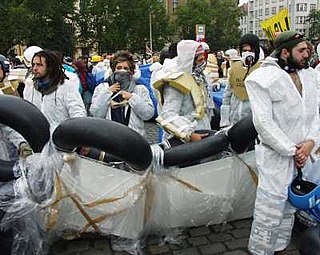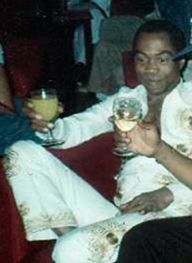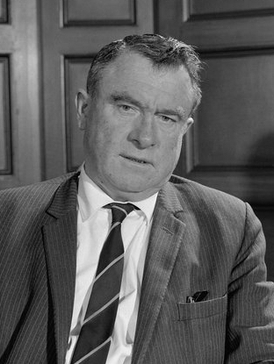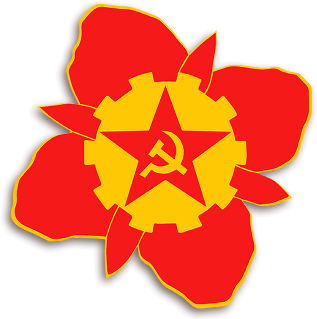Enough Is Enough may refer to:
Enough Is Enough may refer to:
AAA, Triple A, or Triple-A is a three-letter initialism or abbreviation which may refer to:
Change, Changed or Changing may refer to the below. Other forms are listed at § See also

Tute Bianche, Italian for "White Overalls", was a militant Italian social movement, active from 1994 to 2001. Activists were notable for covering. their bodies with white padding so as to resist the blows of police, pushing through police lines, and marching together in large blocks for mutual protection during demonstrations.

Fela Aníkúlápó Kútì was a Nigerian musician and political activist. He is regarded as the principal innovator of Afrobeat, a Nigerian music genre that combines West African music with American funk and jazz. At the height of his popularity, he was referred to as one of Africa's most "challenging and charismatic music performers". AllMusic described him as "a musical and sociopolitical voice" of international significance.
The Almanac Singers was an American New York City-based folk music group, active between 1940 and 1943, founded by Millard Lampell, Lee Hays, Pete Seeger, and were joined by Woody Guthrie. The group specialized in topical songs, mostly songs advocating an anti-war, anti-racism and pro-union philosophy. They were part of the Popular Front, an alliance of liberals and leftists, including the Communist Party USA, who had vowed to put aside their differences in order to fight fascism and promote racial and religious inclusiveness and workers' rights. The Almanac Singers felt strongly that songs could help achieve these goals.
¡Ya basta! is a phrase in Spanish roughly approximate to "Enough is enough!" or "Enough already!" in US English. It has been adopted by several Latin American insurgent groups as an expression of affront towards issues that sparked the original dissent. Its adoption by the EZLN in Mexico as the movement's motto is exemplary of its popularity and ability to rally diverse ideologies under a common goal.
Toyi-toyi is a Southern African dance used in political protests in South Africa.

Stephen Coughlan was an Irish Labour Party politician who served for sixteen years as Teachta Dála (TD) for the Limerick East constituency. During the 1930s and 40s he was a member of the Irish Republican Army but in the post-World War 2 period he moved into politics, first with the Republican Clann na Poblachta party and then later with the Labour Party. After becoming extremely politically powerful in his home of Limerick City, Coughlan was criticised as being an extremely parochial politician who jealously guarded his power base against any challenger, even those in his own party, which resulted in a number of local splits and rivalries that ultimately corroded his support. Politically and socially conservative, Coughlan was frequently at odds with the rest of the Labour party, while his "colourful" behaviour often drew national attention.

Basta(Enough!/Das genügt!) is an album that was released by Quilapayún in 1969. It brings together popular and folk songs from Latin America, the former USSR, and Italy. This album included "La muralla"/The wall - one of the most popular folk songs in Latin America - based on the text of a poem by the Cuban poet Nicolás Guillén.
¡Basta Ya! was a Spanish grassroots organization uniting individuals of various political positions against terrorism and violence, notably ETA, and against the proposal for a new Statute of Autonomy of the Basque Country released by the government of President Juan José Ibarretxe. Its principal activities were anti-terror demonstrations and protests. The ¡Basta Ya! movement was a civic initiative made up of people of differing ideologies, and welcomes any citizens willing to play an active part provided they adhere to three basic principles: defend against terrorism of any sort, regardless of origin or intensity, support all victims of terrorism or of political violence and defend the rule of law, the Spanish Constitution and the Statute of Autonomy of the Basque Country. ¡Basta Ya! was created to promote social mobilization against the perpetrators of specific kinds of violence, to support those who are suffering from them, and to demand that authorities fulfill the requirements of current legislation, respecting the rule of law. The organization believes that criticism of terrorism on moral grounds is important but not enough. Criticism on political grounds is also important, and the initiative understands such criticism to be based on certain values – such as human rights - which are common to all democrats regardless of their party affiliations or their political leanings.
Oi! is a subgenre of punk rock that originated in the United Kingdom in the late 1970s. The music and its associated subculture had the goal of bringing together punks, skinheads, and other disaffected working-class youth. The movement was partly a response to the perception that many participants in the early punk rock scene were, in the words of The Business guitarist Steve Kent, "trendy university people using long words, trying to be artistic... and losing touch."

The Movement for Democratic Change (MDC) was a Zimbabwean political party organised under the leadership of Morgan Tsvangirai. The MDC was formed in 1999 as an opposition party to President Robert Mugabe's Zimbabwe African National Union – Patriotic Front (Zanu-PF). The MDC was made up of many civic groups who campaigned for the "No" vote in the 2000 constitutional referendum, which would limit a president's service to two terms, before the introduction of a prime minister, as well as giving legal immunities to the state.

The South African Youth Revolutionary Council (SAYRCO) was a South African political organisation. SAYRCO profiled itself as a 'third force' in the anti-Apartheid struggle. It was associated with the Black Consciousness Movement.
Basta may refer to:

The Communist Party of Canada (Marxist–Leninist) is a federal political party in Canada. It was founded in 1970 by Hardial Bains, a staunch Stalinist and anti-revisionist. The CPC(M-L) has been registered with Elections Canada as the Marxist–Leninist Party of Canada (MLPC) since 1974, as the party is prohibited from using the name "Communist Party of Canada" in Canadian elections to avoid confusion among voters. The party is not an offshoot of the Communist Party of Canada; its early membership came from student-led organizations active in the 1960s. After a period of alignment with Maoism and China, the CPC(M-L) pursued a Hoxhaist, pro-Albanian line until the early 1990s. At present, the party directs most of its public support to Cuba and North Korea.

"Make America Great Again" is an American political slogan and movement most recently popularized by Donald Trump during his successful 2016 presidential campaign. "MAGA" is also used to refer to Trump's political base, or to an individual or group of individuals from within that base. The slogan became a pop culture phenomenon, seeing widespread use and spawning numerous variants in the arts, entertainment and politics, being used by both supporters and opponents of Trump's presidency. Originally used by Ronald Reagan as a campaign slogan in his 1980 presidential campaign, it has since been described as a loaded phrase. Multiple scholars, journalists, and commentators have called the slogan racist, regarding it as dog-whistle politics and coded language.
¡Basta Ya! is a Spanish grassroots organization.

María Teresa "Maite" Pagazaurtundúa Ruiz, better known as Maite Pagazaurtundúa or Maite Pagaza, is a Spanish politician, activist and writer. For ten years, she has been an MEP in the European Parliament, where she has been a member of the political groups Renew Europe and ALDE.

The March of LGBT Pride is an annual pride parade in Buenos Aires, Argentina. The march promotes the equality and rights of LGBT people. It takes place in November in memory of the creation of the first Argentine and Latin American LGBT organization, Nuestro Mundo, in November 1967.